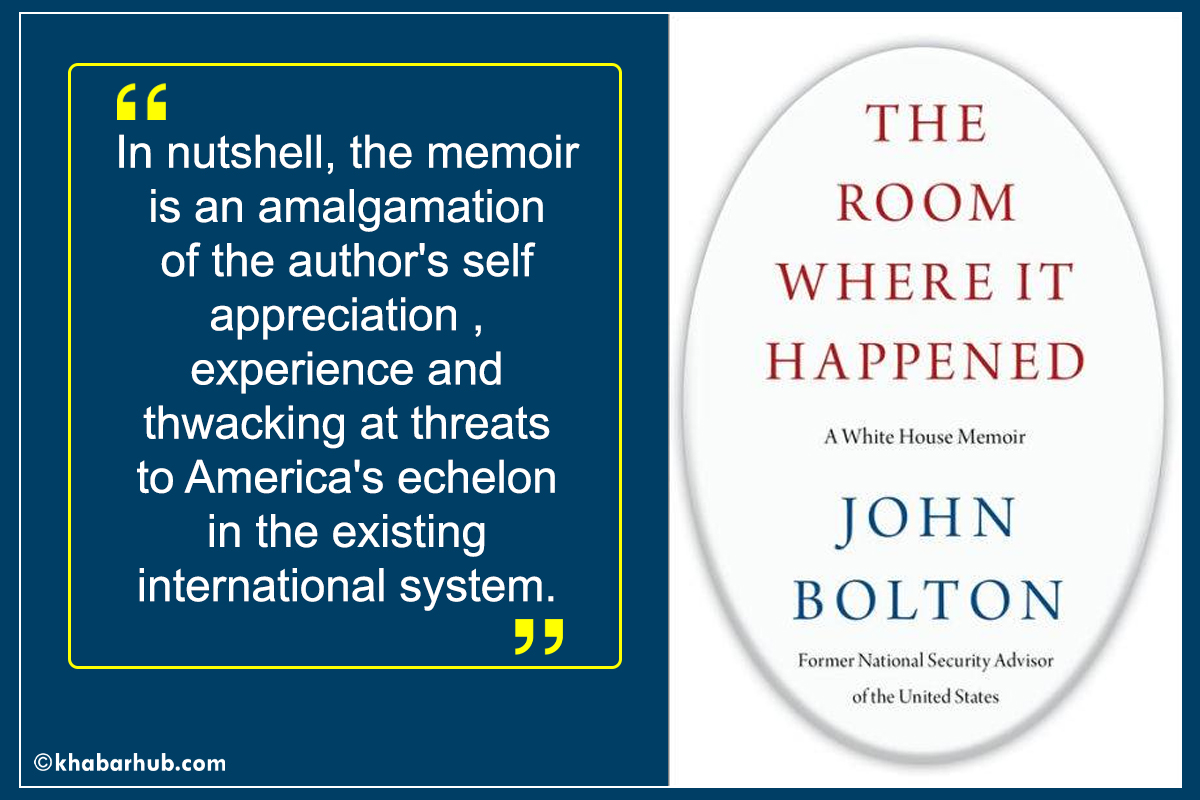The Room Where It Happened: A White House Memoir
11 Jul 2020

“Hard Pounding this, gentlemen. Let’s see who will pound the longest.” – The Duke of Wellington, Rallying his troops at Waterloo, 1815.
“I cannot offer a comprehensive theory of the Trump Administration’s transformation because none is possible. Washington’s conventional wisdom on Trump’s trajectory, however is wrong. The received truth, attractive to the intellectually lazy, is that Trump was always bizarre, but in his first fifteen months, uncertain in his new place, and held in check by an “axis of adults”, he hesitated to act.”
As time passed, however, Trump became more certain of himself, the axis of adults departed, things fell apart, and Trump was surrounded only by “yes men”.”
“The Room Where it Happened: A White House Memoir” is a thought provoking page-turner by John Bolton, who is the former National Security Advisor to President Donald Trump, served as the United States Ambassador to the United Nations from 2005 to 2006, spent many years of his career in public service and held high-level positions in Administrations of Presidents Ronald Reagan, George H.W. Bush and George W. Bush.
The way he mentions his travelling to various European capitals for Summits in Brussels, London and Helsinki is a fascinating read.
The ouvre is interesting ample to introduce the reader to overabundance of events and incidents, ranging from Lilliputian to Brobdingnagian experiences of the writer, the then insider of the White House.
Embellished in fifteen chapters, the opus allows the reader to examine painstakingly everything written from “The Long March To A West Wing Corner Office” to “Epilogue”.
Elaboration of contents on Trump’s tweets on various contexts, ranging from negotiation with North Korea to speeches on steps on Syria, from talks with Theresa May to dialogues with Vladimir Putin, seems fastidiously meticulous observation Bolton has made in his tenure.
The way he mentions his travelling to various European capitals for Summits in Brussels, London and Helsinki is a fascinating read.
Bolton admits that it took him about a month after his arrival at the Trump White House to have any chance to assess systematically how things worked inside.
Since Republican Donald Trump won the US presidency in 2016 in a surprise victory over the first-ever female nominee, Democrat Hillary Clinton, the course of international politics changed unprecedentedly.
Bolton explicitly states that everything Trump did and does do in the White House is not unintended for his reelection in 2020. Continuation of whim and impulse in Trump’s Administration can be heard of while going on going through the piece thoroughly.
Bolton admits that it took him about a month after his arrival at the Trump White House to have any chance to assess systematically how things worked inside.

Throughout his West Wing tenure, Trump wanted to do what he wanted to do, based on what he knew and what he saw as his own best personal interest.
And in Ukraine, he seemed finally able to have it all. Bolton writes that his timing of resigning couldn’t have been better. Ukraine doesn’t seem likely place as battleground to imperil an American presidency.
But that is exactly what happened in 2019, exploding literally just days after he resigned.
In the chapter entitled “A Tale of Three Cities- Summits in Brussels, London and Helsinki”, Bolton reminisces his engagement, however in self-important tone. He says that Trump’s thinking was like an archipelago of dots, like individual real estate deals.
Similarly, ” Protecting US Elections from Acts of War” is an exciting chapter. Bolton opines that Trump’s inconsistent views and decisions on Russia made all their work complicated, and cyber and non-cyber issues often bled into each other.
Trump loses his way and then his nerve. According to Bolton, what he and other two senior advisors wanted to achieve in Afghanistan were (1) preventing the potential resurgence of ISIS and al-Qaeda, and their attendant threats of terrorist attacks against America;and (2) remaining vigilant against the nuclear weapons program in Iran on the west and Pakistan in the east.
Here, the author hesitates to halt without expressing his judgement on China.
Regarding the role in the World Trade Organization, Bolton blames China of having stolen intellectual property, of having forced technology transfer from, and of having discriminated against, foreign investors and businesses; of having engaged in corrupt practices of “debt diplomacy” through instruments such as the “Belt and Road Initiative” and of having continued managing its domestic economy in statist, authoritative ways.
Bolton blames China of having gamed the organization, successfully pursuing a mercantilist policy in a supposedly free trade body, instead of adhering to its norms. He writes,” In economics, after joining the WTO, China did exactly opposite of what was predicted.”
In nutshell, the memoir is an amalgamation of the author’s self appreciation , experience and thwacking at threats to America’s echelon in the existing international system.
Entertaining the reader with glimpses of his important assignments in various dates at the end of the opus, Bolton expresses in his own words: ” I was not aware of the famous whistleblower’s complaint, nor of its handling within the Executive Branch, but that complaint and the publicity it subsequently received transformed the Washington political landscape in completely unforeseen ways.”
(The writer is an undergraduate student, Tribhuvan University, Nepal)
(Nepal Institute for International Cooperation and Engagement (NIICE), Nepal’s independent think tank, and Khabarhub — Nepal’s popular news portal — have joined hands to disseminate NIICE research articles from Nepal)












